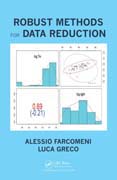
Gives a clear, practical motivation to apply the methods in economics, genetics, psychology, engineering, social science, environmental research, and other fields Demonstrates how to use R to perform robust analyses Describes popular dimension reduction techniques, such as principal component analysis and canonical correlation analysis Discusses non-robust distance and model-based approaches to cluster analysis Provides the data sets and R code for the examples as well as code for robust techniques not included in any R package on the book’s CRC Press web page Summary Robust Methods for Data Reduction gives a non-technical overview of robust data reduction techniques, encouraging the use of these important and useful methods in practical applications. The main areas covered include principal components analysis, sparse principal component analysis, canonical correlation analysis, factor analysis, clustering, double clustering, and discriminant analysis. The first part of the book illustrates how dimension reduction techniques synthesize available information by reducing the dimensionality of the data. The second part focuses on cluster and discriminant analysis. The authors explain how to perform sample reduction by finding groups in the data. Despite considerable theoretical achievements, robust methods are not often used in practice. This book fills the gap between theoretical robust techniques and the analysis of real data sets in the area of data reduction. Using real examples, the authors show how to implement the procedures in R. The code and data for the examples are available on the book’s CRC Press web page.
- ISBN: 9781466590625
- Editorial: CHAPMAN & HALL LTD.
- Encuadernacion: Tela
- Páginas: 297
- Fecha Publicación: 16/04/2015
- Nº Volúmenes: 1
- Idioma:
